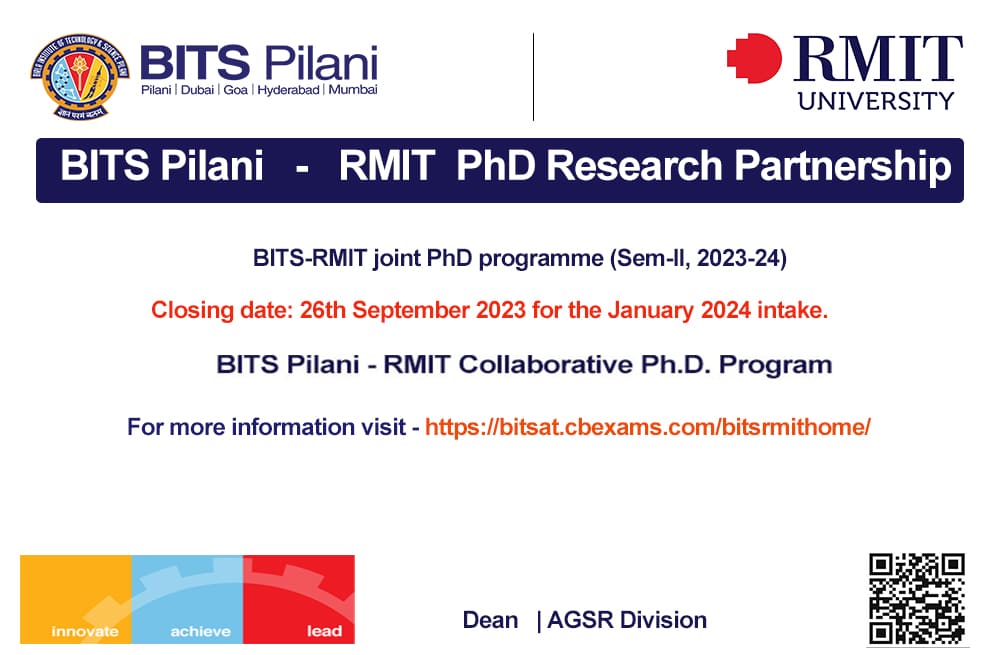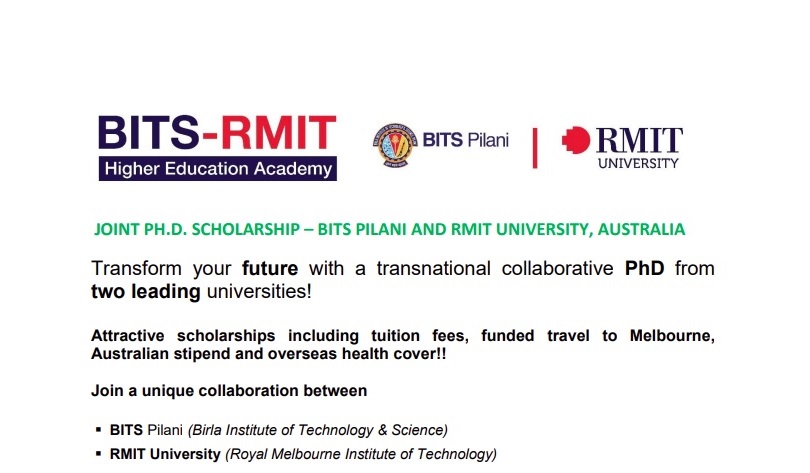Ph.D. positions in Environment and Water Resources Engineering are currently available with a full scholarship for students enrolled in a Joint Ph.D. program at the BITS Pilani, and RMIT University, Australia.
Application Deadline: September 26, 2023, for January 2024 intake
How to Apply: Send in your complete application using the following link:
Visit: https://bitsat.cbexams.com/bitsrmithome/
Minimum and desirable qualifications needed:
M.Tech/M.E./M.Sc. in Civil/Environmental/Water Resource Engineering or similar fields.
Candidates having experience of Data analytics and machine learning, numerical an simulation modeling using MATLAB, programming skills (Python, MATLAB) would be preferred.
HIGHLIGHTS OF THE SCHOLARSHIP
For candidates enrolled in a Joint Ph.D. between RMIT University and BITS Pilani:
• BITS Pilani Ph.D. fellowship: INR 45,800 per month.
• Receive a full RMIT tuition fee scholarship for the duration of your enrolment
• Benefit from the world – class research facilities in India and Melbourne
• Travel to Australia for up to one year of candidature and be supported by an Australian stipend for the duration of your time in Melbourne
Candidates admitted to the program are jointly supervised by faculty from BITS and RMIT.
PROJECT DETAILS
Project ID: BITSRMIT24101188
Project title: CLIMATE BASED SMART PREDICTION OF FAILURE AND OVERFLOW CONDITIONS OF BURIEDSEWER PIPES
Project Team: Rallapalli Srinivas & Anupam Singhal, BITS Pilani |Robert Dillan, RMIT University, Australia
Description: Sewage networks (SNs) play a crucial role in maintaining public health and sanitation. However, the increasing occurrences of blockages and overflows pose significant threats to our communities. To address these issues, the objectives of the project are: (1) Comprehensive literature assessment of prior research on buried concrete sewer pipe corrosion related to sewage flow/characteristics and identification of factors and sub-factors contributing to corrosion and blockage in SNs; (2) Detailed examination of the physicochemical characteristics of FOG and sewage transferred to sewer pipes based on experiments, sensors networks and IoT devices, with an illustration of their significant levels; (3) To aid in strategic planning, using lab simulations and AI based tools for predicting the corrosion of concrete sewer pipes caused by the effects of FOG and sewage depending on weather and soil conditions; (4) Investigating the intricate interactions that exist between flow conditions and sewer degradation in SNs using advanced numerical and
statistical modeling; (5) To evaluate the remaining service life of sewer pipes through the utilization of calibrated ANN modeling techniques; and (6) To propose cost-effective recommendations pertaining to the design of new pipes as well as the maintenance of existing pipelines, with a specific focus on ensuring optimal flow and appropriate buried conditions. The results of this study will help solve the issue of insufficient failure observations and lower the sewer corrosion forecast uncertainty. This solution provides an understanding analysis for the concerned environmental decision-makers on developing further fruitful actions towards FOG effect on SNs, and saving expenses in chemical dosing, sewer pipe rehabilitation.
For more information write to: r.srinivas@pilani.bits-pilani.ac.in / anupam_singhal@pilani.bits-pilani.ac.in

















